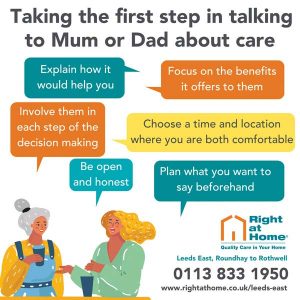One of the most difficult decisions a family will make is how best to care for an ageing parent or parents.
As your loved one grows older, you might be asking yourself the difficult question of whether they need professional care and support. While it might be daunting to choose the right care solution for your loved one, empowering them to stay in their own home has many benefits for their health, wellbeing and continued independence.

Bringing up the topic of care with your elderly loved one can be a challenging but necessary conversation. Here is some guidance from local homecare provider Right at Home – Leeds East on how to navigate the situation:
- Choose the right time and place: It’s important to choose a time and place where your loved one feels comfortable and relaxed. Avoid having the conversation during stressful or emotional times.
- Empathise with their concerns: Start the conversation by acknowledging their feelings and concerns. Let them know that you understand it’s difficult to accept help and that you appreciate everything they’ve done to take care of themselves up until now.
- Listen to their concerns: Your loved one may have concerns or fears about getting professional care. Listen to their concerns and try to address them. Reassure them that professional care can help them maintain their independence and quality of life.
- Ask your loved one for their input: Where possible try to involve them in the decision-making process. Listen to their opinions on what type of care they want and when they want it. This can help them feel more in control and less like they are being forced into something.
- Be honest and open: It’s important to be honest and open about your concerns and the reasons why you think professional care is necessary. Avoid making accusations or placing blame.
- Find a trusted care company: ask for a CareGiver who is experienced, trained, and compassionate. Schedule a meeting between the CareGiver and your loved one before they start providing care. This will support your loved one in feeling more comfortable with the idea of having a stranger come into their home. At Right at Home – Leeds East, we introduce our CareGivers and Clients at the earliest opportunity to ensure their personalities gel well and the Client is as comfortable as possible.
- Start small: Start with a few hours of care per week and gradually increase the amount of time as your loved one becomes more comfortable with the CareGiver. This can help your loved one adjust to having someone else in their home and give them time to build a special bond with their CareGiver.
- Address their concerns: If your loved one has specific concerns or fears about getting homecare services, address them directly. Work with the CareGiver to find solutions that address these concerns, such as providing extra security measures or finding a CareGiver who speaks their language.
- Seek the help of a professional: If your loved one is resistant to the idea of homecare services, consider seeking the help of a professional, such as a geriatric care manager or social worker. Right at Home – Leeds East can also support and guide you on how to approach the situation and may be able to offer additional resources and options for care.

The benefits of homecare for your loved one
When it becomes clear that your loved one would benefit from support at home, there are several options for you to consider. The most important thing, of course, is choosing a high-quality care provider who will tailor the right type of support to you and your family.
Homecare can be a great solution to maintain your loved one’s independence. They have likely spent their entire life in familiar and comfortable surroundings and do not want to give that up. By providing care in their own home, your loved one can maintain their routines, their environment and their independence. Having a sense of continued control in their life can have a positive effect on their mental and emotional wellbeing. Right at Home – Leeds East understand the importance of maintaining your loved one’s independence and create bespoke homecare packages that factor in their routines and hobbies, helping them live life to the fullest even as they grow older.
Secondly, homecare can provide individualised care. Nursing homes often have many residents, and their staff may not be able to provide individualised care to each resident. This can result in a lack of attention to the specific needs of your loved one. Homecare, on the other hand, provides one-on-one care, which means that the caregiver can cater to the unique needs of your loved one. They can ensure that they receive the right amount of attention, and that their needs are met.
Thirdly, homecare can provide a more comfortable and familiar environment. Nursing homes can be overwhelming for elderly people, especially those who suffer from dementia or other cognitive impairments. Homecare, on the other hand, can provide a familiar and comfortable environment that your loved one knows and loves. This can help to reduce their stress and anxiety, and can promote feelings of safety and security.
Fourthly, homecare can provide a better quality of life. Nursing homes often have strict schedules and routines, which may not fit the needs and preferences of your loved one. By providing homecare, your loved one can have control over their schedule, and can choose the activities that they enjoy. They can also receive care that is tailored to their specific needs, which can result in a better quality of life.
Lastly, homecare can be more cost-effective than nursing homes. Nursing homes often come with high fees and charges, which can be difficult to afford for many families. Homecare, on the other hand, can be tailored to fit your budget, and can be more affordable than nursing homes.
In conclusion, choosing homecare for your elderly loved one can provide many benefits that cannot be matched by nursing homes. By promoting independence, providing individualised care, creating a familiar environment, improving the quality of life, and being more cost-effective, homecare is the superior choice for many families.

Right at Home – Leeds East is a local homecare provider offering tailored personal-centred support to people in the comfort of their own homes. The team will work closely with you and your loved one to understand their unique requirements and interests.
If you have any questions about the benefits of homecare or would like more information on Right at Home – Leeds East’s services, please call 0113 833 1950
or email [email protected]

























































